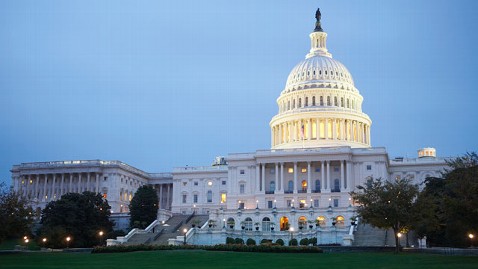The Next Fiscal-Crisis Deadline: Gov't Shutdown Looms March 27

Image credit: Siri Stafford/Getty Images
As unbelievable as it might seem, yet another fiscal deadline hangs over Washington.
Unless Congress agrees to extend funding by March 27, the federal government will shut down.
This time, there's a silver lining: It could provide a convenient opportunity for President Obama and his Republican counterparts to reach an agreement that would prevent the worst effects of budget sequestration, the automatic spending cuts set to take effect Friday.
Since October 2010, the federal government has been funded by a series of "continuing resolutions," temporary extensions of current discretionary spending on programs, other than mandatory entitlements such as Social Security and Medicare and some defense spending. The current measure, passed in October 2012, runs out March 27, meaning Congress is slated for another continuing resolution before then.
The government-shutdown deadline falls neatly within the timeline of sequestration cuts.
House Appropriations Chairman Hal Rogers, R-Ky., doesn't want the debate on sequestration and deficit reduction to interfere with continued government funding, according to spokeswoman Jennifer Hing.
Rogers is simply pushing to extent current levels while drafting new appropriations bills for the Department of Defense, military construction and the Department of Veterans Affairs that would free those areas of spending from across-the-board cuts by allowing appropriators to reallocate money.
Senate Appropriations Chairwoman Barbara Mikulski, D-Md., has said she wants to use the March 27 deadline as an opportunity to deal with sequestration. "[Senate Majority Leader Harry] Reid knows that a straight CR [continuing resolution] just won't do it. It's just a change of date," Mikulski told Politico.
Said one House Republican aide: "That kind of seems to be where the debate is moving, that they would use the CR to modify the sequester."
If sequestration goes into effect Friday, the March 27 deadline will fall just before sequestration's worst purported consequences are scheduled to arise.
Obama's cabinet members have issued some drastic warnings, and the worst - fewer commercial flights, prison violence, undetected and unthwarted terrorist plots, longer TSA lines, less border security, longer waits at customs and at ports - have to do with furloughs at the Transportation Security Administration, Bureau of Prisons, FBI and Customs and Border Patrol.
Such furloughs won't happen until early April because agencies must give workers at least 30 days' notice, in most cases, before sending them home. If Obama issues his sequestration order Friday, March 1, agencies will likely issue furlough notices on or after Monday, March 4, meaning furloughs (and the accompanying sequester calamities) wouldn't begin until April 4.
With furloughs looming eight days later, it seems March 27 would be a good time for Obama and Congress to agree on a deal to avoid the sequester.
Various options remain. President Obama last week proposed a short-term deficit deal to postpone the sequester and give Congress enough time to hammer out a longer-term deficit deal. Some Republicans have suggested granting federal agencies more authority to reach the lower spending levels, freeing them to avoid the sequester's across-the-board, program-level cuts. The extremely remote possibility remains that a broad deficit deal will arrive soon.
But if the March 27 deadline means anything for sequestration, the cuts could go into effect this week and then be nullified about a week before the worst consequences happen.